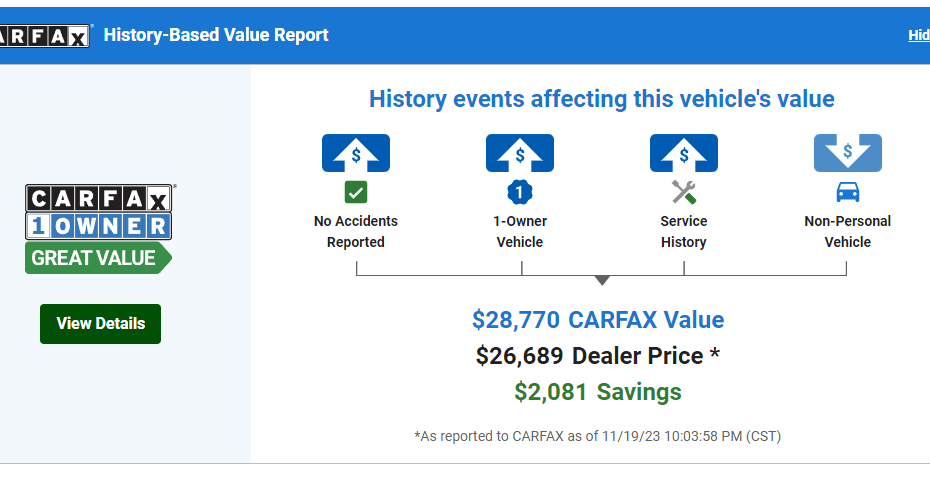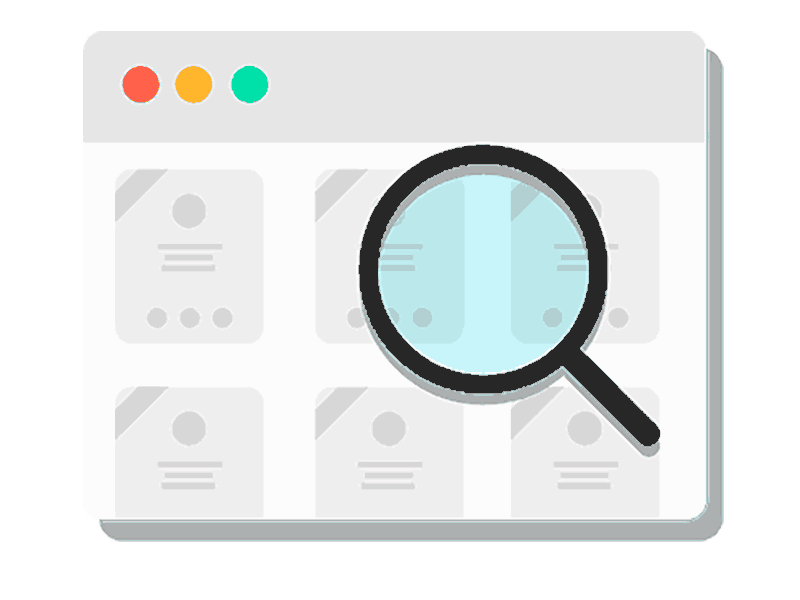The automotive world is complex, with various factors influencing car values, conditions, and purchase decisions. Two companies have risen to prominence in helping both consumers and professionals navigate these complexities: Kelley Blue Book (KBB) AND CARFAX. Used car values are influenced by a vehicle’s accident and service history, ownership type (personal, police vehicle, fleet), and maintenance records. CarFax & KBB both provide updated car values that affect the average price and additional costs in a used car purchase.
Check the Value of your Vehicle according to Carfax:
Overview of Kelley Blue Book (KBB)
Kelley Blue Book (KBB) is a trusted resource for determining the value of new and used cars. Established in 1926, KBB has become synonymous with car pricing, providing data on trade-in values, private party sales, and suggested retail prices. KBB’s data is widely used by dealerships, financial institutions, and individual buyers and sellers to ensure that vehicle pricing is fair and competitive.
KBB’s primary focus is on car valuation. By analyzing market trends, sales data, and proprietary information, KBB offers accurate and up-to-date vehicle pricing guides. This makes it an essential tool for those looking to buy, sell, or trade in a vehicle.
Overview of Carfax
Carfax, on the other hand, specializes in providing detailed vehicle history reports. Founded in 1984, Carfax aggregates data from thousands of sources to offer comprehensive reports on individual vehicles. These reports include information on accidents, title issues, previous ownership, service records, and more.
Carfax is invaluable for buyers and sellers of used vehicles, as it helps verify a car’s history, ensuring transparency and trust in the transaction process. Carfax’s reports are often a critical component in determining a vehicle’s condition and worth.
CarFax Values vs. Kelley Blue Book values
CarFax Values, focusing on a vehicle’s specific history, often differ from Kelley Blue Book values, which provide broader market-based valuations. For the example of this 2020 MERCEDES-BENZ GLC 300 KelleyBue Book provides a value between $25,300 to $27,775 for a vehicle in excellent condition and a value of $22,471 to $25,246 if the vehicle is in fair condition. Compared to Carfax this vehicle in excellent condition is valued slightly lower at Kelley Bluebook however Kelley Bluebook provides a higher value for vehicles marked as fair condition.
Carfax History-Based value:
By default, Carfax will determine the value based on the assumption that the vehicle is for retail sale and is in excellent condition. To update the assumptions that affect this vehicle’s value the estimated values will change. We compared the car value range for a 2020 MERCEDES-BENZ GLC 300 based on Excellent condition vs fair condition and Wholesale vs retail.
The vehicle specifics in our example are:
2020 MERCEDES-BENZ GLC 300 4MATIC with VIN: WDC0G8EB4LF700958
Body: 4 DOOR SPORT UTILITY VEHICLE
Engine: 2.0L Turbo I4 255hp 273ft-lbs
Drivetrain: AWD
Fuel: GASOLINE
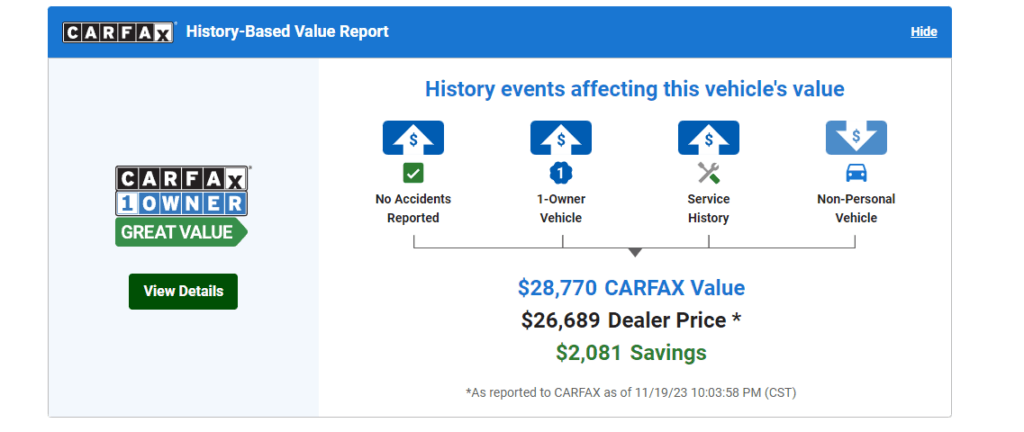
By changing the type of sale from Retail to Wholesale and changing the condition from Excellent to fair the value changes from $27,390 to $19,800
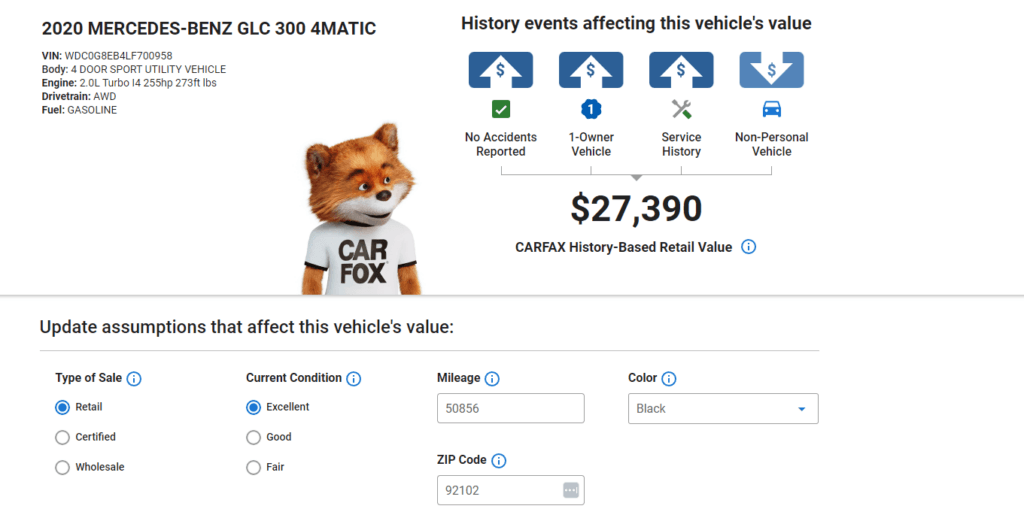
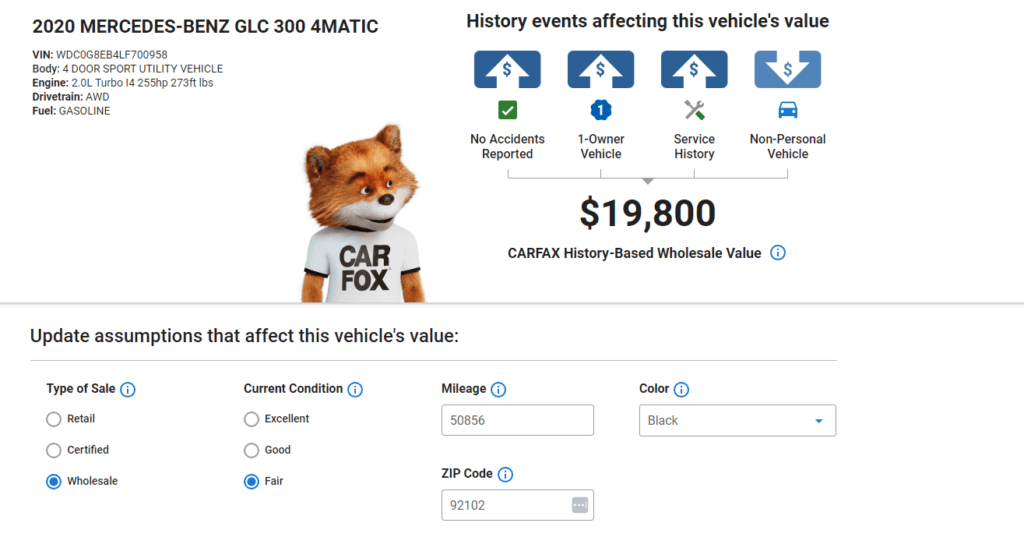
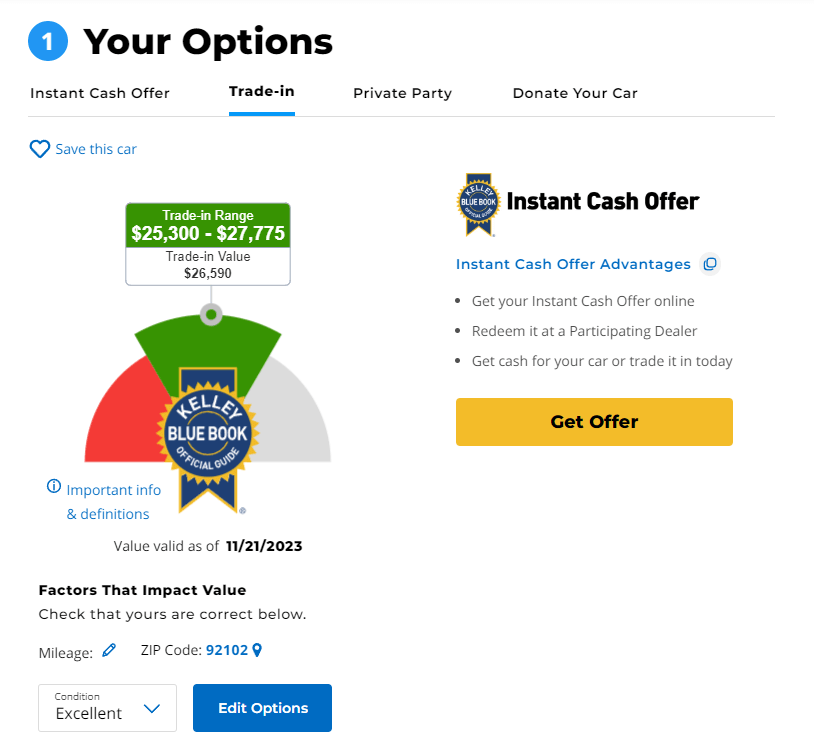
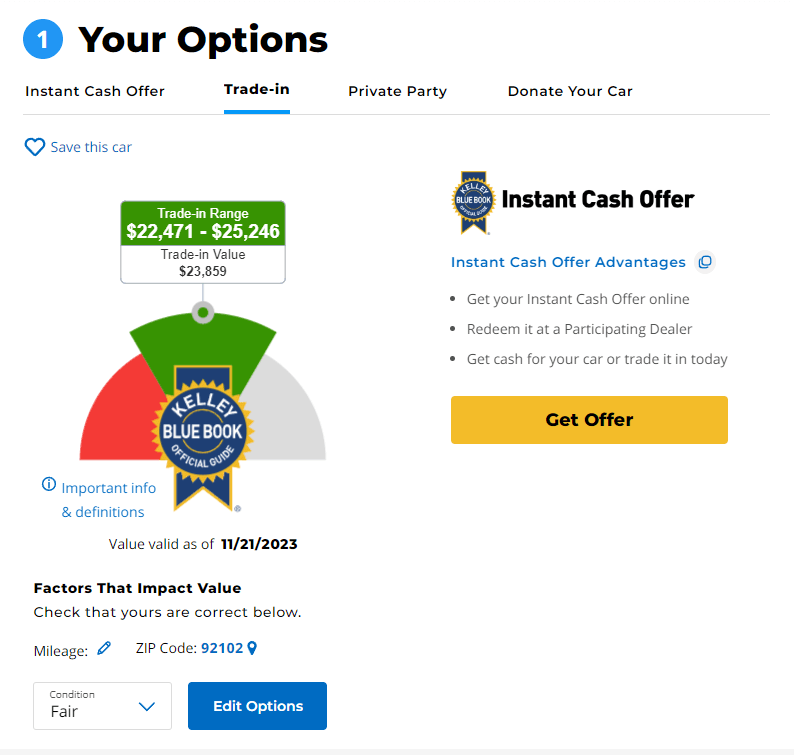
WHY IS KBB BOOK value USEFUL?
The Kelley Blue Book value is useful because it serves as a trusted, data-driven resource that informs consumers and dealers about the fair market price of vehicles. Its comprehensive approach and accessibility make it a valuable tool in the automotive industry.
The Kelley Blue Book (KBB) value is widely recognized as a useful tool for determining the estimated market value of new and used vehicles. Here are some reasons why the KBB book value is valuable:
1. Trusted Industry Standard
- Reliability: KBB has been a trusted source for vehicle valuation since 1926, and it is widely used by dealerships, private sellers, and buyers alike. Its reputation adds credibility to its valuations.
- Market Influence: Many dealerships and financial institutions use KBB values when negotiating prices, offering trade-ins, and setting loan amounts, making it an essential reference point in the automotive market.
2. Comprehensive Data
- Detailed Analytics: KBB uses extensive data, including sales transactions, auction results, and vehicle condition to determine its valuations. This comprehensive approach helps ensure that the values are accurate and reflect real market conditions.
- Adjustment for Various Factors: The valuation considers factors such as the vehicle’s make, model, year, mileage, condition, and geographic location, providing tailored estimates.
3. Consumer and Dealer Guidance
- Informed Decision-Making: KBB values help consumers and dealers make informed decisions by offering a clear benchmark for negotiations. It bridges the gap between buyer expectations and seller asking prices, facilitating smoother transactions.
- Trade-In and Purchase Planning: Sellers can determine a fair price to list their vehicle, while buyers can assess whether an asking price is reasonable. Trade-in values are also easily calculated, giving consumers an idea of what to expect when trading in their vehicle.
4. Free and Accessible
- User-Friendly Interface: KBB offers free access to its valuation tools online, making it convenient for anyone to check vehicle prices and conduct research without needing to pay for the service.
- Multiple Valuation Options: Users can access private party values, trade-in values, and certified pre-owned (CPO) values, depending on their specific needs.
5. Resale Value Insights
- Resale Trends: KBB tracks trends in the used car market, helping consumers understand how a vehicle’s value might change over time. This can be particularly useful for those planning to resell their vehicle or buy a used car with high resale potential.
WHY IS Carfax BOOK value USEFUL?
Carfax Book Value is useful for several reasons:
- Accurate pricing: It provides a reliable estimate of a used vehicle’s value based on its history and current market conditions.
- Comprehensive data: Carfax uses extensive data, including accident reports, service records, and mileage information, to determine a more precise valuation.
- Negotiation tool: Buyers and sellers can use this value as a reference point when negotiating the price of a used car.
- Insurance purposes: Insurance companies may use Carfax Book Value to determine premiums or payouts for claims.
- Trade-in assessment: It helps consumers understand what they might expect when trading in their vehicle at a dealership.
- Market trends: The valuation reflects current market trends, giving users insight into how a particular make and model is performing in the used car market.
- Informed decision-making: It allows potential buyers to make more informed decisions by understanding the fair market value of a vehicle.
The History of Kelley Blue Book (KBB)
Origins and Founding of Kelley Blue Book
Kelley Blue Book was founded in 1926 by Les Kelley, a car dealer in Los Angeles, California. Kelley initially used a blue notebook to list the values of cars he wanted to purchase. The notebook quickly became a trusted reference for car dealers and eventually evolved into a formal publication known as the Kelley Blue Book.
Evolution into a Trusted Brand
Throughout the decades, KBB expanded its offerings to include values for used cars, trade-ins, and certified pre-owned vehicles. By the 1990s, KBB had established itself as a leader in vehicle valuation, with its data used by dealerships, banks, and insurance companies across the United States.
Today, Kelley Blue Book is a household name, with its website and mobile app making it easier than ever for consumers to access vehicle pricing information.
The History of Carfax
Origins and Founding of Carfax
Carfax was founded in 1984 by Ewin Barnett III and Robert Daniel Clark, with the mission of providing vehicle history information to consumers. Initially, Carfax focused on collecting data related to odometer fraud, a significant issue in the used car market at the time. By 1986, Carfax had developed a database containing information on over 10,000 vehicles.
Development of Vehicle History Reporting
Over the years, Carfax expanded its data collection efforts, incorporating information from insurance companies, law enforcement agencies, and state motor vehicle departments. This expansion allowed Carfax to provide more comprehensive reports that included details about accidents, title issues, and service records.
Carfax’s commitment to transparency and accuracy has made it a trusted resource for used car buyers and sellers. Today, Carfax reports are often seen as an essential part of the used car buying process, helping consumers make informed decisions.
How KBB Works
Car Valuation Process
Kelley Blue Book uses a proprietary system to calculate the value of a vehicle. This system takes into account various factors, including the make, model, year, mileage, condition, and regional demand for the car. KBB also analyzes sales data from auctions, dealerships, and private parties to provide accurate pricing information.
Factors Influencing KBB Values
Several factors influence KBB values, including:
- Vehicle Condition: Cars in excellent condition typically receive higher valuations.
- Mileage: Lower mileage often results in a higher value.
- Market Trends: Supply and demand in the automotive market can significantly impact a vehicle’s value.
- Location: Regional differences in vehicle demand can affect pricing.
Using KBB for Buying and Selling
For buyers, KBB helps determine if a vehicle is priced fairly. For sellers, KBB provides a baseline for setting an asking price. Both parties can use KBB to negotiate effectively, ensuring that the transaction is fair for everyone involved.
How Carfax Works
Carfax Vehicle History Report Explained
A Carfax report provides detailed information about a vehicle’s history. Key elements of a Carfax report include:
- Accident History: Reports on any accidents the vehicle has been involved in, including the severity of the damage.
- Title Information: Ensures that the vehicle has a clean title and is not listed as salvage or rebuilt.
- Service Records: Details the maintenance and repairs performed on the vehicle over its lifetime.
- Ownership History: Provides information on the number of previous owners and the locations where the vehicle was registered.
- Odometer Readings: Verifies the accuracy of the vehicle’s mileage.
Carfax Information Sources
Carfax collects data from over 100,000 sources, including:
- State motor vehicle agencies
- Insurance companies
- Police departments
- Dealerships and service centers
- Auction houses
Common Uses of Carfax Reports
Carfax reports are primarily used by:
- Buyers: To verify a vehicle’s history and ensure there are no hidden issues.
- Sellers: To provide transparency and build trust with potential buyers.
- Dealerships: To assess the condition of trade-in vehicles and provide customers with detailed information.
Key Differences Between KBB and Carfax
Purpose and Function
The most significant difference between KBB and Carfax is their purpose:
- KBB focuses on providing vehicle valuations.
- Carfax specializes in vehicle history reports.
KBB helps you understand what a car is worth, while Carfax helps you understand the car’s background.
Data Sources
- KBB relies on sales data from auctions, dealerships, and private parties.
- Carfax aggregates information from state agencies, insurance companies, law enforcement, and service records.
Use Cases
- KBB is ideal for pricing vehicles for sale or trade-in.
- Carfax is essential for verifying the history and condition of used vehicles.
KBB Pricing Models
KBB offers different pricing models based on the type of transaction:
Trade-In Value
- Represents the amount a dealership will offer for a vehicle when traded in for another car.
Private Party Value
- Reflects the amount a buyer would pay to purchase a vehicle from a private seller.
Certified Pre-Owned Value
- Provides the value of vehicles that have been inspected and certified by the manufacturer.
Types of Carfax Reports
Carfax offers various types of reports depending on the needs of the buyer or seller:
Basic vs. Comprehensive Reports
- Basic Reports provide essential details about the vehicle’s history, including accidents and title status.
- Comprehensive Reports offer additional information such as service records, detailed ownership history, and odometer readings.
Carfax for Dealers
- Dealers use Carfax to assess trade-ins and provide transparency to customers.
Carfax for Consumers
- Consumers use Carfax to verify the history of a vehicle before making a purchase, ensuring there are no surprises.
When to Use KBB
KBB is particularly useful in the following situations:
Buying a Car
- Use KBB to determine if a dealer’s asking price is fair.
Selling a Car
- Use KBB to set a competitive asking price for your vehicle.
Trading in a Car
- Use KBB to negotiate a fair trade-in value with the dealership.
When to Use Carfax
Carfax reports are most beneficial in these scenarios:
Buying Used Cars
- Check the Carfax report to verify the vehicle’s history and avoid potential problems.
Selling Used Cars
- Provide a Carfax report to potential buyers to build trust and transparency.
Verifying Vehicle Condition
- Use Carfax to ensure that the vehicle’s condition matches what the seller claims.
Accuracy and Reliability
How Accurate is KBB?
KBB’s accuracy depends on several factors, including the accuracy of the data provided by users and the dynamic nature of the car market. While KBB provides reliable estimates, the actual transaction price may vary based on negotiation and market conditions.
How Reliable is Carfax?
Carfax reports are generally considered reliable, but they are only as accurate as the data they receive. If an accident or repair was not reported, it may not appear in the report. However, Carfax’s wide range of data sources ensures that its reports are as comprehensive as possible.
Factors Impacting Accuracy
- KBB: Changes in market conditions, regional demand, and user-provided data can affect accuracy.
- Carfax: The completeness of data from reporting agencies can impact the reliability of a Carfax report.
User Experience and Accessibility
Website and Mobile App Reviews
- KBB: The KBB website and mobile app are user-friendly, with clear navigation and easy access to car valuation tools.
- Carfax: The Carfax website and app are also intuitive, offering users easy access to vehicle history reports.
Customer Support
- KBB: Offers robust customer support via phone, email, and online resources.
- Carfax: Provides customer support through phone, email, and live chat, as well as an extensive FAQ section.
Ease of Use
Both KBB and Carfax are designed with ease of use in mind, making it simple for consumers to find the information they need.
KBB vs. Carfax: Which is Better for Buyers?
Benefits for Buyers
- KBB helps buyers understand the fair market value of a vehicle, ensuring they don’t overpay.
- Carfax provides detailed vehicle history information, helping buyers avoid cars with hidden issues.
Drawbacks for Buyers
- KBB: Values can vary based on market fluctuations.
- Carfax: Not all accidents or repairs may be reported.
KBB vs. Carfax: Which is Better for Sellers?
Benefits for Sellers
- KBB helps sellers set a competitive asking price.
- Carfax builds trust with potential buyers by providing transparency.
Drawbacks for Sellers
- KBB: Sellers may find that buyers negotiate based on KBB values, which could be lower than desired.
- Carfax: If a vehicle has a less-than-perfect history, it may be harder to sell.
The Future of KBB and Carfax
Innovations and Technological Advancements
Both KBB and Carfax are continuously innovating to meet the needs of modern consumers. Advances in AI and data analytics are likely to improve the accuracy and comprehensiveness of their offerings in the coming years.
Evolving Consumer Needs
As consumers become more tech-savvy, both KBB and Carfax are adapting to provide mobile-friendly platforms and more personalized experiences.
Pros and Cons of Using KBB
Advantages
- Trusted source for car valuations
- User-friendly platform
- Widely recognized and used by dealerships
Disadvantages
- Values can vary based on market fluctuations
- Relies on user-provided data, which may not always be accurate
Pros and Cons of Using Carfax
Advantages
- Comprehensive vehicle history reports
- Helps buyers avoid cars with hidden issues
- Widely trusted and used in the industry
Disadvantages
- Not all accidents or repairs may be reported
- Can be expensive for individual reports
Expert Tips for Using KBB and Carfax
How to Maximize the Value of Both Platforms
- Use KBB to set a baseline for pricing and negotiate effectively.
- Use Carfax to verify a vehicle’s history and ensure that you’re making an informed purchase.
Common Mistakes to Avoid
- Relying solely on KBB or Carfax: Use both platforms in conjunction to get a complete picture of a vehicle’s value and history.
- Ignoring local market conditions: KBB values may not reflect regional demand, so consider local factors when pricing a vehicle.
What’s Your Car Worth?
The worth of your vehicle is dependent on several factors including the condition, history, current mileage, and geographical location. CarFax History-Based Value is a tool that estimates a vehicle’s worth based on its detailed history. Factors like maintenance records, accident history, and ownership transfers are considered to determine a fair price, essential for both private sellers and buyers.
FAQs About KBB and Carfax
1. Is KBB free to use?
Yes, KBB offers free access to its car valuation tools.
2. How much does a Carfax report cost?
A single Carfax report typically costs around $44.99 , but package deals are available for multiple reports.
3. How often is KBB updated?
KBB updates its vehicle values weekly to reflect current market conditions.
4. Can I trust a Carfax report?
Carfax reports are generally reliable, but they are only as accurate as the data provided by reporting agencies.
5. Should I use both KBB and Carfax when buying a car?
Yes, using both KBB and Carfax will give you a more complete understanding of the vehicle’s value and history.
6. Can I get a free Carfax report?
Some dealerships offer free Carfax reports when you inquire about a used vehicle.
Conclusion
When it comes to navigating the complexities of buying and selling vehicles, Kelley Blue Book (KBB) and Carfax are two of the most trusted resources available. While KBB provides valuable insight into the fair market value of a car, Carfax offers transparency into a vehicle’s history, helping consumers make informed decisions.
Ultimately, the best approach is to use both tools together. KBB gives you a clear understanding of what a car is worth, while Carfax ensures that the vehicle’s past aligns with its present condition. By leveraging the strengths of both platforms, you’ll be well-equipped to navigate the car buying and selling process with confidence.
